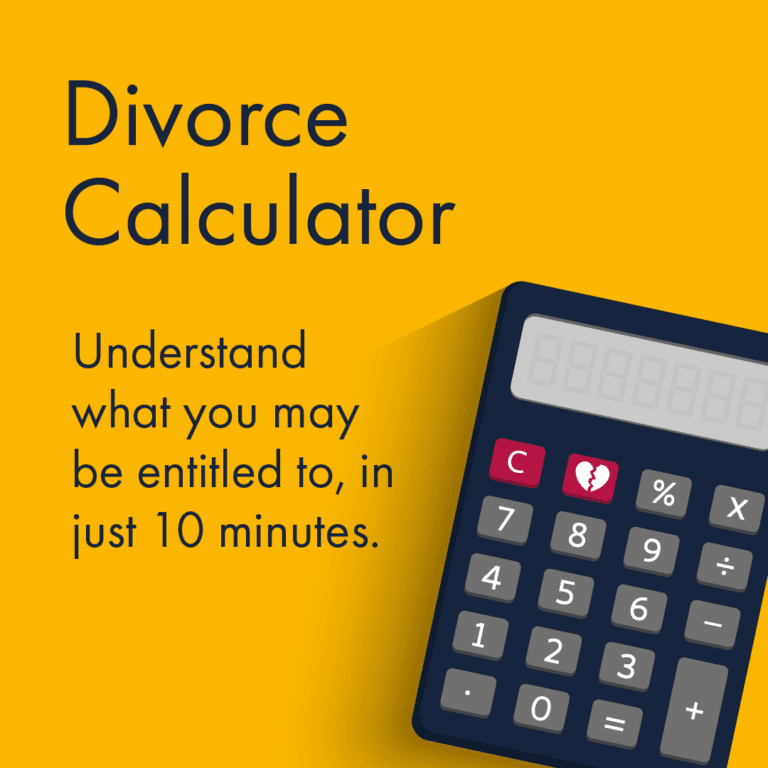 Use the calculator
Use the calculator
How is wealth divided in high net worth divorce?
Succession Wealth analysed the Office for National Statistics’ Wealth and Assets Survey data and the number of divorces in England and Wales, to estimate the makeup of the assets of divorcing couples whose net financial wealth is £1 million or more.
They found that 550 couples with a net financial wealth of one million pounds or more will divorce each year and estimate that collectively these individuals have around £1.91 billion of net wealth, equating to an average of about £3.48 million per couple.
Their wealth was divided into four broad categories: financial wealth, property wealth, physical wealth and private pension wealth. ‘Financial wealth’ means cash and savings-type assets, such as bonds, shares and so on, ‘property wealth’ means real property (i.e., land and buildings) and ‘physical wealth’ means other valuable physical assets, such as cars, jewellery and paintings.
The breakdown was as follows: financial wealth represented 20% of the assets, worth on average about £712,000, property wealth represented 31% of the assets, worth on average about £1,075,000, physical wealth represented 5% of the assets, worth on average about £186,000, and private pension wealth represented a whopping 43% of the assets, worth on average about one and a half million pounds. In other words, private pension wealth is by some margin the most significant asset of many couples whose net financial wealth is £1 million or more.
-
Financial wealth
Financial wealth is any kind of cash, bank account or equity fund. This wealth is split and shared in the same way as savings in a low net worth divorce. This will form a substantial part of the settlement.
In ultra-high-net-worth cases, particular regard may be paid to the contributions of each party over the course of the marriage. While section 25 of the Matrimonial Causes Act 1973 (MCA 1973) refers to contributions in broader terms, including ‘any contribution by looking after the home or caring for the family, inevitably in ultra-high-net-worth cases much of the focus will be on financial contributions made, usually, by one of the parties in particular.
Furthermore, one of the most common issues that need to be considered in an ultra-high-net-worth divorce is which assets are matrimonial and which may be excluded from the settlement as non-matrimonial property. Talk with specialist divorce lawyers like Stowe to find out more.
-
Property wealth
Property wealth is, of course, any wealth tied up in assets like land and property. In high-net-worth cases, this wealth may be partly in England or the United Kingdom or abroad, and can take the form of holiday homes, overseas investments, managed rental properties and so on.
Again, as is the case with a normal divorce, dividing property wealth is a thorny issue. Property assets may be divided between the divorcing partners even in cases where only one individual contributed towards their purchase, particularly in the case of long-standing marriages.
There is no such thing as a typical or standard division of property wealth. As such, it is vitally important that you instruct specialist divorce solicitors to maximise and protect the amount you are entitled to.
-
Physical wealth
Physical wealth refers to smaller assets such as jewellery, cars, clothing and accessories. In everyday divorces these assets may not be worth much, but they typically are in high net worth divorces, and so are worth special consideration.
-
High net worth divorce & pensions
There are three common ways of dividing pensions in high net worth divorces: offsetting against other assets, pension sharing orders and pension attachment orders.
Offsetting, at its simplest, involves the spouse with the pension keeping it, but the other spouse is compensated by receiving a greater share of other assets.
Pension sharing means transferring the pension ‘pot’, or part of it, from one spouse’s pension to a pension in the name of the other spouse.
Pension attachment orders redirect all or part of the pension benefits to the other spouse when the pension comes into payment. Which of these options is right for you can be a complex question.
-
Business valuation divorce settlement
Courts are flexible with regard to dividing business interests in a divorce. Where possible, the Court will prefer to give one partner a larger share of other assets, or a larger maintenance amount, rather than forcing the other partner to sell off their business or divide ownership of it between the two.
As such, divorce business valuation does not per se mean that your business will be sold, ownership transferred, or necessarily changed in any way.
Prenuptial agreements and high net worth divorce
Prenuptial agreements, or ‘prenups’, are commonly used to define the terms of a potential separation between high net worth married couples. However, there are things that many people don’t know about them.
Prenuptial agreements and high net worth divorce
Prenuptial agreements, or ‘prenups’, are commonly used to define the terms of a potential separation between high net worth married couples. However, there are things that many people don’t know about them.
-
Are Prenups Legally Binding?
Although prenups agreements are not legally binding in England and Wales (In Scotland, properly prepared prenups are enforceable and legally binding), they will demonstrate to the court the intention of the parties if the marriage breaks down.
A prenup is more likely to be considered ‘fair’ if,
- Both parties received independent legal advice about the agreement at the outset
- Full and frank financial disclosure of both parties’ assets was made before the agreement
- Neither party was under pressure or duress to sign the agreement against their will
- There has been no significant change that would make the agreement inappropriate (for example, the birth of children)
- The agreement is fair and realistic. If the division of assets is weighted too heavily in favour of one party, it may be judged to be unfair by the courts
- Prenups should be reviewed periodically and amended during the marriage, particularly when any child or children are born
Providing some of these ‘fairness’ criteria are met, the court has the discretion to apply weight to the agreement, and it may be upheld.

Partner hiding assets in divorce
It is not uncommon for ultra-high-net-worth individuals to conceal or attempt to hide assets.
In these cases, an independent Forensic Accountant is often instructed to look at the assets disclosed by each party to ensure transparency and fairness.

At Stowe Family Law, we have an in-house Forensic Accountant in our team who can support you if you believe your ex is hiding assets, stalling with information, the business or asset valuations seem low or the declared income does not match the lifestyle and more.
Of course, uncovering the true value of pension (and other) assets is only half of the story. The other half is working out how those assets should be divided between the parties.
Contact Stowe Family Law solicitors
We are Stowe, the family solicitors with extensive experience in high net worth divorce.
We understand your unique needs where other local divorce solicitors would not. We have offices nationwide in London, Manchester, Birmingham and nearly 40 other locations meaning that we offer a face-to-face service that you can trust.
We provide case-tailored help for high net worth divorce at 0330 383 0319, or request a free call back on a date and at a time of your choice.
What our clients say
Newsletter Sign Up
Sign up for advice on divorce and relationships from our lawyers, divorce coaches and relationship experts.
Privacy Policy
